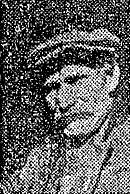|
Moderated by NW Okie! |
Volume 9 , Issue 332007Weekly eZine: (376 subscribers)Subscribe | Unsubscribe Using Desktop... |
1918 News - Veteran of Indian Wars Dies At Alva

We found this interesting early Oklahoma tidbit in The Oklahoman, dated September 1, 1918, pg. 42, with the following headlines: Veteran of Indian Wars Dies At Alva - "Daniel P. McGee Was With Major Reno When He Let Custer Perish
Alva, Okla., Aug. 31, 1918 -- "Daniel P. McGee, who died at his home in Alva Last week, had a most interesting career and was perhaps the only white man in Oklahoma who rode over the scene of the Custer massacre the morning after the battle and saw the mangled forms of the white chief with yellow hair, and his gallant men, where "By the river's bank and between the rocks of the ravine they lay in their bloody atire."
McGee came to Alva eighteen years ago (1900) and has since made this his home. For some months he had been in failing health, caused by leakage of the heart, and the last few weeks he had been unable to leave the house.
Daniel Patrick McGee was born near Woodstock, Canada, west, April 2, 1850. His mother died when he was 7 years old, and at the age of 10 he ran away from home, thereafter leading a roving life. For seven years he was a sailor before the mast, engaged in the carrying trade between New Orleans and central and southern ports.
In 1874, Mr. McGee entered the government service at Fort Snelling, Minn., as citizen wagoner for Company K, Seventh United States cavalry, then under the active command of Gen. George A. Custer. He accompanied Custer's command from Fort Abraham Lincoln in June, 1876, when that gallant officer started out to locate the rebellious Sioux.
Reno left Custer to fate... When Custer located Sitting Bull's band on the Little Big Horn on the fatal morning of the massacre, he divided his command into two detachments, directing Major Reno to make a detour with his command and attack the Sioux in flank and rear after he and Custer had engaged the enemy in direct attack.
McGee was with Major Reno, who disobeyed Custer's orders and permitted the heroic leader and his gallant command to perish without making an effort to save them. Mr. McGee believes that if Custer had been properly supported by Reno that not only most of Custer's men would have been saved but that the Indians would have been put to utter rout.
As it was, Mr. McGee and his comrades had to sit idle in the timber along the river, hearing the tumult of battle until the last shots told that Custer and his men were all slain. The Indians fled, in the night as they knew that General Terry was coming with 2,000 infantry men, and the next morning Major Reno's command rode over the battle field and saw the remains of Custer and his brave troopers.
Didn't Scalp Custer... McGee testified to the truth of the report that the Indians had such a wholesome respect for Custer, though devil, that they did not scalp him, although all who fell with him were scalped. Mr. McGee was afterwards engaged in the war with the Nez Per Caz Indians in 1878 and was wounded."
| View or Add Comments (0 Comments)
| Receive
updates ( subscribers) |
Unsubscribe
| © . Linda Mcgill Wagner - began © 1999 Contact Me | |
